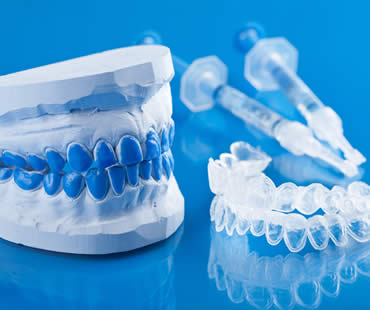
by Dr. Adkins | Nov 1, 2019 | Blog, Dental Topics 2, Root Canal Treatment
Have you been told that you may need a root canal treatment? Are you worried because of things you’ve heard in the media about how “awful” a root canal is? Don’t worry about what you’ve heard; endodontic therapy isn’t at all what you’d think. Let’s debunk some myths!
- Myth #1: Root canal treatment is very painful. This isn’t true! In fact, a root canal treatment is performed specifically to relieve a patient’s pain, not to cause more. After a root canal treatment, you might feel some tenderness, but the pain you felt when the damaged tissue and infection was still inside the tooth will be completely gone. Once the swelling from the procedure has gone down, you will be able to use your new tooth exactly the way you could use your natural tooth when it was completely healthy.
- Myth #2: Root canal therapy or other endodontic work can lead to disease elsewhere in the body. Another falsehood! Root canal treatments don’t spread disease to the rest of the body, rather, they remove infected tissue and bacteria from the body, preventing the affected tooth from becoming re-infected.
- Myth #3: Extraction is better than root canal treatment. Extraction is not preferred to root canal treatment! Whenever possible, it’s preferred to keep your natural tooth. Your natural tooth’s roots stimulate and preserve the bone of your jaw, as well as providing adequate support to the surrounding teeth. Dental implants or dental bridges can be problematic, both in function and in dietary restrictions. In fact, an extraction can lead to several prolonged appointments to perform replacement procedures, treatments that are far more involved than a root canal treatment.
Endodontic treatment is an extremely common dental procedure that can provide durable, long-lasting restorations that will function as your natural tooth did. If you believe you may need a root canal treatment, talk to your endodontist or dentist today to see how this successfully proven treatment can help you and your smile needs.
We treat patients from McDonough and the surrounding area

by Dr. Adkins | Oct 25, 2019 | Blog, Dental Topics 2, Root Canal Treatment
A toothache can ruin your life, at least until you have treatment that relieves the pain. Headaches, mouth pain, or inability to chew can all accompany a tooth problem. It is not unusual for tooth pain to be linked to tooth decay, and when it becomes advanced you just can’t ignore it. This is when root canal therapy is valuable.
What is the procedure?:
Root canal treatment focuses on the pulp cavity, which is the inside of the tooth. When the pulp is infected or inflamed, it needs to be completely removed from the tooth in order for it to heal. It doesn’t matter if the damage to the pulp results from severe decay, tooth fracture, faulty crown, repeated dental procedures, or trauma. Even if the damage isn’t visible or causing unbearable pain, the bottom line is that the interior of the tooth must be cleaned out, disinfected and sealed to prevent future infection. A crown is typically placed on top of the tooth to protect it and complete the procedure.
Why is it necessary?:
If left untreated, an infected pulp can lead to intense pain or spread to other parts of the body. Root canal treatment is the best way to save the tooth and restore its function. Other benefits of the procedure are maintaining the tooth’s natural look, protecting other teeth from excessive wear, restoring normal chewing ability, and allowing normal sensation and biting force.
How long does it take?:
The procedure is more routine than you might think. An experienced dental professional can complete the process is one or two appointments, depending on your specific case. Once the procedure is complete, your repaired tooth should last as long as the rest of your teeth.
We look forward to seeing you in our McDonough dental office

by Dr. Adkins | Oct 18, 2019 | Blog, Dental Topics 2, Teeth Whitening
If you have just completed professional teeth whitening treatment, you probably want to protect your investment and extend the life of your shiny, bright smile. To enhance your healthy new smile and keep it white and bright, it’s important to follow a few simple guidelines:
- Do follow good oral hygiene practices by brushing and flossing regularly after every meal.
- Don’t drink colored beverages such as red wine, coffee, cola or tea immediately after treatment, and continue to avoid them whenever possible to prevent staining.
- Do drink beverages with a straw when you must drink dark-colored beverages to prevent the liquid from touching your teeth and causing stains.
- Don’t eat pigment-intense foods for several weeks after whitening. Berries, dark chocolate, soy sauce and other foods with a dark color can leave residue that leads to staining.
- Do use a gentle tooth whitening mouthwash after eating to rinse away food and debris that could cause staining and to keep your breath fresh.
- Don’t wear lipstick or colored gloss for at least one week after whitening treatment, as your teeth are still sensitive immediately after treatment and lipstick can leave pigments that will stain your teeth.
- Do use a whitening toothpaste to increase the results and aid in the longevity of your treatment.
- Don’t forget to eat a healthy diet and drink water to keep your teeth strong and vibrant.
A whiter smile can brighten your face and take years off your looks. By following these easy recommendations, you can extend the life of your whitening treatment and enjoy the benefits of your bright, new smile.
Our dental office is located in McDonough

by Dr. Adkins | Oct 11, 2019 | Blog, Dental Topics 2, Root Canal Treatment
If root canal treatment has been recommended for you, you’re probably a little nervous. Maybe you’re a LOT nervous, but if you’re thinking about putting off your treatment, don’t. If you need root canal therapy, the underlying conditions that necessitate it will not go away left untreated. In fact, they’ll just get worse and worse over time, causing you more pain and discomfort and potentially leading to more serious complications.
If you don’t treat the infection in your tooth, it will spread. Beginning at your tooth’s roots, it will travel to your jawbone and eventually to your healthy teeth. Your entire jawbone can be put at risk. By treating your infection promptly with root canal therapy, your mouth can be free of infection and you will begin the process of healing.
Serious diseases like heart disease and diabetes have been directly linked to gum disease. During pregnancy, many problems including low birth weight and premature birth can occur as a direct result of infection and bacteria in the mouth. Several types of cancers have all been shown to have a link to poor overall oral health. The mouth is truly the pathway for everything that goes into the body, and if it’s providing a steady stream of bacteria and infection to be spread throughout your body, it’s extremely problematic.
Don’t worry about pain following your procedure. Root canal therapies are meant to relieve pain, not cause it. You’ll be surprised how much better you’ll feel after your mouth is infection-free.
If you ignore your infected tooth for long enough, it may either fall out on its own or need to be extracted. Missing teeth come with a long list of oral issues, including difficulties with bite alignment and speech only corrected with some kind of dental restoration.
Don’t wait to have your root canal treatment. Don’t open yourself up to the myriad of consequences that could result from postponing treatment.
If you live in the McDonough area contact us today

by Dr. Adkins | Sep 27, 2019 | Blog, Dental Topics 2, Oral Surgery
Gum disease is a serious problem. You should treat it as soon as possible following the recommendations of your dentist. Also known as periodontal disease, it has several treatments, depending on the severity of the issue.
Your first course of action is to completely revamp your oral hygiene habits. Daily flossing and brushing following meals are essential habits to develop. You must have a clean mouth before you go to bed. If you smoke, you should stop. Your mouth’s health depends on it.
If you haven’t been keeping up with your professional checkups and cleanings, you need to start again. Long-term gum health is greatly impacted by the plaque, tartar, food debris and bacteria left on teeth. Hardened calculus, or calcified plaque, can be removed using a process called scaling. This process may require local anesthesia.
Your progress will be evaluated by your dentist to see if your gum tissue is recovering. With enough progress and response to treatment, your gum disease treatment may not progress beyond these initial steps; however, for more severe cases of gum disease, you may require oral surgery.
Surgical procedures are available that can regenerate and repair the soft gum tissue in the mouth, as well as hard tissues such as bone or teeth. Your oral surgeon will want to reduce or completely eliminate gum pockets, or open areas beneath the gum line, improving and renewing gum to tooth attachment. Normal oral functions and aesthetic appearances are aimed to be restored.
There are many sedation dentistry options available to patients treating their gum disease with oral surgery. These include local anesthesia and IV or conscious oral sedation. Talk to your oral surgeon to see what’s appropriate for your specific needs.
Don’t wait to treat your gum disease. Do what you need to do to ensure a lifetime of better oral hygiene and gum health.
Schedule your appointment at our McDonough dental office

by Dr. Adkins | Sep 20, 2019 | Blog, Dental Topics 2, Root Canal Treatment
Root canal treatments are specifically designed to relieve the tooth pain associated with an infected tooth root. Patients come in with pain, and often leave the procedure with less discomfort than before. However, if you’ve recently had a root canal treatment on one or more of your teeth, you might be experiencing discomfort following the procedure. Fortunately, there are things you can do at home to take care of it.
Are your gums sore, tender or swollen surrounding the affected tooth? This is likely the result of the tiny metal clips that affix a rubber dam around the tooth, protecting it and protecting your mouth. The clips are attached along the gum line, and can leave tiny bruises or sometimes small cuts in the soft gum tissue. This pain should alleviate within two days of the treatment.
Is the tooth itself sore? This is a common occurrence and is typically the result of an inflammation of the mouth tissues that encase the tooth root. The tools used by the endodontist to perform the procedure can irritate the tissues.
Both of these types of pain can be dealt with by several over-the-counter analgesics. The ones that are most recommended to treat dental pain are those that possess anti-inflammatory agents: naproxen sodium, ibuprofen or aspirin, etc. If you are also taking narcotics prescribed by your dentist, do not take any further medication, over-the-counter or prescription, until you have checked with your dentist. Dangerous reactions can occur.
If you have been prescribed antibiotics, do not stop until you have completed each recommended dose. This ensures that your tooth remains free of infection and can heal thoroughly.
Ask your endodontist if you have other concerns about treating your post-root canal treatment pain.
We look forward to seeing you in our McDonough dental office








 (470) 665-5292
(470) 665-5292  E-Mail Us
E-Mail Us 
